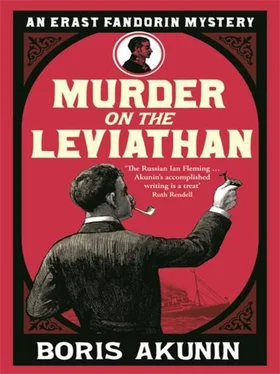Boris Akunin - Murder on the Leviathan
Здесь есть возможность читать онлайн «Boris Akunin - Murder on the Leviathan» весь текст электронной книги совершенно бесплатно (целиком полную версию без сокращений). В некоторых случаях можно слушать аудио, скачать через торрент в формате fb2 и присутствует краткое содержание. Год выпуска: 2005, ISBN: 2005, Издательство: New York : Random House, c2004., Жанр: Исторический детектив, на английском языке. Описание произведения, (предисловие) а так же отзывы посетителей доступны на портале библиотеки ЛибКат.
- Название:Murder on the Leviathan
- Автор:
- Издательство:New York : Random House, c2004.
- Жанр:
- Год:2005
- ISBN:9781400060511
- Рейтинг книги:3 / 5. Голосов: 1
-
Избранное:Добавить в избранное
- Отзывы:
-
Ваша оценка:
Murder on the Leviathan: краткое содержание, описание и аннотация
Предлагаем к чтению аннотацию, описание, краткое содержание или предисловие (зависит от того, что написал сам автор книги «Murder on the Leviathan»). Если вы не нашли необходимую информацию о книге — напишите в комментариях, мы постараемся отыскать её.
*НАСТОЯЩИЙ МАТЕРИАЛ (ИНФОРМАЦИЯ) ПРОИЗВЕДЕН, РАСПРОСТРАНЕН И (ИЛИ) НАПРАВЛЕН ИНОСТРАННЫМ АГЕНТОМ ЧХАРТИШВИЛИ ГРИГОРИЕМ ШАЛВОВИЧЕМ, ЛИБО КАСАЕТСЯ ДЕЯТЕЛЬНОСТИ ИНОСТРАННОГО АГЕНТА ЧХАРТИШВИЛИ ГРИГОРИЯ ШАЛВОВИЧА.
### Amazon.com Review
Usually, crime writers who give birth to protagonists deserving of future series want to feature those characters as prominently as possible in subsequent installments. Not so Boris Akunin, who succeeds his celebrated first novel about daring 19th-century Russian sleuth Erast Fandorin, __, with the less inventive *Murder on the Leviathan*, in which the now former Moscow investigator competes for center stage with a swell-headed French police commissioner, a crafty adventuress boasting more than her fair share of aliases, and a luxurious steamship that appears fated for deliberate destruction in the Indian Ocean.
Following the 1878 murders of British aristocrat Lord Littleby and his servants on Paris's fashionable Rue de Grenelle, Gustave Gauche, "Investigator for Especially Important Crimes," boards the double-engined, six-masted *Leviathan* on its maiden voyage from England to India. He's on the lookout for first-class passengers missing their specially made gold whale badges--one of which Littleby had yanked from his attacker before he died. However, this trap fails: several travelers are badgeless, and still others make equally good candidates for Littleby's slayer, including a demented baronet, a dubious Japanese army officer, a pregnant and loquacious Swiss banker's wife, and a suave Russian diplomat headed for Japan. That last is of course Fandorin, still recovering two years later from the events related in *The Winter Queen*. Like a lesser Hercule Poirot, "papa" Gauche grills these suspects, all of whom harbor secrets, and occasionally lays blame for Paris's "crime of the century" before one or another of them--only to have the hyper-perceptive Fandorin deflate his arguments. It takes many leagues of ocean, several more deaths, and a superfluity of overlong recollections by the shipmates before a solution to this twisted case emerges from the facts of Littleby's killing and the concurrent theft of a valuable Indian artifact from his mansion.
Like the best Golden Age nautical mysteries, *Murder on the Leviathan* finds its drama in the escalating tensions between a small circle of too-tight-quartered passengers, and draws its humor from their over-mannered behavior and individual eccentricities. Trouble is, Akunin (the pseudonym of Russian philologist Grigory Chkhartishvili) doesn't exceed expectations of what can be done within those traditions. *--J. Kingston Pierce*
### From Publishers Weekly
Akunin writes like a hybrid of Caleb Carr, Agatha Christie and Elizabeth Peters in his second mystery to be published in the U.S., set on the maiden voyage of the British luxury ship *Leviathan*, en route to India in the spring of 1878. Akunin's young Russian detective/diplomat protagonist, Erast Fandorin, has matured considerably since his debut in last year's highly praised *The Winter Queen*, set in 1876, and proves a worthy foil to French police commissioner Gustave Gauche, who boards the *Leviathan* because a clue suggests that one of the passengers murdered a wealthy British aristocrat, seven servants and two children in his Paris home and stole priceless Indian treasures. The intuitive, methodical Fandorin, who joins the ship at Port Said, soon slyly takes over the investigation and comes up with an eclectic group of suspects, all with secrets to hide, whom Gauche assigns to the same dining room. The company recite humorous or instructive stories that slow down the action but eventually relate to the identification of the killer. Gauche offers at least four solutions to the crimes, but in each case Fandorin debates or debunks his reasoning. The atmospheric historical detail gives depth to the twisting plot, while the ruthless yet poignant arch villain makes up for a cast of mostly cardboard characters. Readers disappointed by the lack of background on Fandorin will find plenty in *The Winter Queen*.
Copyright © Reed Business Information, a division of Reed Elsevier Inc. All rights reserved.









